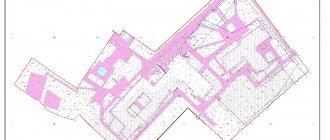In accordance with Article 19 of the Housing Code of the Russian Federation, the housing stock is a complex of real estate objects located within one subject of the Federation. Such objects must be intended for habitation not only according to the mark in the cadastral register, but also in accordance with technical and sanitary regulations. Today, the law defines the following categories of property in the structure of the housing stock:
- emergency housing;
- dilapidated houses;
- new buildings;
- commercial and municipal real estate that has been in the possession of its owners for a long time, but its current condition allows its further safe intended use.
The housing stock of the Russian Federation is being formed in order to ensure the organization of a register of objects throughout the territory of Russia. This allows for timely inspection of property, major and ongoing repairs of premises, as well as timely write-off and resettlement of citizens within the framework of government social programs. Housing stock management and maintenance are carried out by housing and communal services, homeowners' associations and commercial management companies.
Division of housing stock
The form of accounting for State Housing Fund objects implies the formation of a complex structure. This makes it possible to divide all real estate into groups for further effective management. Depending on the form of ownership of the building, the following classification is distinguished:
- residential properties owned by the state;
- affiliation with a municipality (local authorities of a constituent entity of the Russian Federation or a specific locality);
- property of a legal entity (garden partnerships, cooperatives with non-privatized objects);
- private housing.
The private housing stock will include:
- individual houses;
- apartments for which the privatization procedure has been completed;
- communal housing.
Termination of the deal
The tenant can move to another property at any time. Termination of the agreement occurs by mutual consent.
The termination procedure for the lessor is somewhat more complicated. He has the right to cancel the transaction in the following cases:
- The tenant violates the terms of the property provided.
- Violates the rules of residence. For example, constant noise at night.
- Payment for the use of the premises for six months or more is not credited to the landlord's account.
- The tenant has not paid utility bills for six months or more.
- The employer dies.
- The premises become uninhabitable.
Types of housing funds
Improvement and maintenance of the housing stock is a complex task, which is aggravated by the need for large financial investments, both from residents and from the state budget. Therefore, taking into account the financial needs to maintain the condition of the property, all objects were divided into groups according to their intended use.
This allows us to identify those categories of buildings that require an early financial injection. Thus, structures will be classified as follows:
- settlement of migrants and refugees;
- use to generate income (principle of commerce);
- private;
- intended for privileged categories of the population;
- specialized objects.
Depending on the type, further measures will be determined to maintain the condition of the structure, as well as the determination of the main principles of improvement and the creation of comfort for users.
Specialized housing funds
Specialized real estate is a type of housing stock that is intended for temporary public use. Form of ownership – municipal or state. This category may also include property owned by individuals and legal entities, but transferring housing for temporary use on the basis of a commercial lease agreement.
This level will include:
- Housing for official use, regardless of purpose and form of ownership. For example, temporary provision of accommodation for posted workers. It is common practice to provide dormitory rooms to law enforcement officers and factory workers.
- Formation of a list of objects in which persons holding positions in state and municipal authorities can live. Since the basis for obtaining temporary rights to use an object is election to a position, the opportunity to occupy housing is lost along with dismissal.
- Military personnel serving under contract. The procedure for providing military personnel with housing is established by legal norms. Thus, when a citizen is transferred from one locality to another, as well as when a person is employed, he must be provided with housing no later than three months after the relevant order is issued.
- Developments subordinate to educational institutions and intended for temporary residence of full-time and part-time students.
- Social homes (orphanages, for the elderly).
Lease agreement
Registration of the contract is free and takes about a month.
The paper is solely in writing. The text of the agreement specifies the type of housing provided, address, technical characteristics, and a list of co-tenants. The structure of the document looks like this:
- Subject of the agreement
- General provisions
- Rights and obligations of the parties
- Termination of an agreement
- Payments under the contract
- Duration of the agreement
- Other conditions
- Details of the parties
- Signatures of the parties
Here is an example of an apartment rental agreement:
It is concluded on an ongoing basis and has no expiration date.
Social housing funds
The housing stock of social apartments involves the provision of housing to citizens under the social rental program. This is obtaining the right to use real estate free of charge, which is available only to a limited list of applicants. The main condition is confirmation of the need to improve living conditions or to obtain housing in general.
A social queue is formed from applicants. To add yourself to the list of applicants, the participant must collect a complete package of related documents and send them to the city council administration. As practical examples show, the waiting period can reach six months or more. It all depends on the locality and the number of people interested.
When forming the queue, there is a list of persons receiving the right to social housing outside the queue.
Is forced eviction possible?
Tenants can independently move out of social housing if it does not meet legal requirements or when a new family member arrives. Voluntary termination of the contract leads to the fact that citizens lose the right to receive a new property on the basis of social rent.
Even the state, represented by the lessor, can unilaterally terminate the agreement. This is only possible if the tenants violate the terms of the document. Typically, the reasons for such a decision on the part of the municipality include:
- citizens refuse to pay utility bills for more than six months or a longer period of time;
- the optimal condition of the property is not maintained, for example, people do not want to carry out cosmetic repairs;
- rules of public order are violated.
In case of forced termination of the contract, citizens lose the right to use residential premises, and will also not be able to obtain another place to live. Although in fact people can reapply to be placed in the queue, they usually face refusal.
Individual housing stock
The housing fund for social use is the opportunity to live in an apartment indefinitely without the right to acquire property claims to it. Individual housing – apartments and houses that are fully owned by individuals. Main features of objects:
- the owner is a specific individual (sometimes the buyer is a legal organization);
- will consist of apartments in new buildings, premises received under an equity participation agreement, as well as houses built as part of individual housing construction;
- intended purpose - accommodation.
The owners of such real estate have the opportunity to carry out legal transactions when using specific objects. This applies to the transfer of goods by inheritance, donation, and sale.
What is included in the payment for a social rented apartment?
Considered as a whole, payment for housing includes the following components:
- Payment of rent according to the agreement.
- Payment for housing and communal services.
- Payment for housing maintenance and repairs.
Citizens classified as low-income are exempt from paying rent. However, utility bills and maintenance of the premises remain their responsibility.
Social housing is a good alternative for people who do not have the opportunity to purchase property and live in unfavorable conditions. With this type of relationship, the only financial obligation remains to pay for housing and communal services and repairs of the premises.
Commercial housing funds
Commercial activity involves generating income. In the case of real estate, this is the rental of housing in exchange for a fixed monetary reward. The procedure for transferring property for rent depends on who owns a particular property. So, if the owner of the property is the municipality or the state, then vacant apartments that were not divided on the basis of a social tenancy agreement are transferred for rent.
That is, only after the need for free housing no longer exists can apartments be offered to applicants on a commercial basis. Individuals can also earn income through rental housing. To do this, a lease agreement is drawn up, under which the parties stipulate the conditions for temporary use of the property with payment of the subsequent rental price. Citizens need to take into account the fact that income received must be taxed.
Therefore, once a year the owner of the property prepares an income statement, which he submits to the Federal Tax Service at his place of residence. The declaration shows the total amount of profit and calculates 13% in favor of the state.
Grounds for refusal and actions in this case
There are two legal grounds for refusing to conclude a social housing deal:
- the citizen provided an incomplete package of documents;
- Before submitting the application, the person deliberately worsened the condition of the housing so that the premises were declared unfit for habitation.
After refusal, the citizen has the right to resubmit documents. If, in the opinion of the applicant, the refusal was illegal, then he can file a pre-trial complaint against the decision. When this step does not give the desired result, it is worth turning to the court for a trial.
Housing fund for refugees and internally displaced persons
According to regulations, refugees are recognized as persons who are forced to move to the territory of the Russian Federation due to threats to personal health and life. This status is confirmed in Russia by submitting evidentiary documents. Only after confirming your status can you apply for subsidized housing.
The components of such a residential complex are separate apartments, rooms in communal apartments and dormitories. What type of real estate refugees can apply for depends on the composition of the family and the number of relatives. The capabilities of a specific territory are also taken into account. Not all municipalities are ready to rent out several apartments at once.
The right to housing is lost along with the loss of the preferential status of a migrant, which is subject to regular confirmation. In addition to the possibility of social rental of real estate, refugees also claim equal rights in employment and access to basic state and municipal services.
Commercial real estate rental is one of the most profitable areas of activity. Depending on the city, the cost of living per month can reach 20 - 30 thousand rubles. Additional income is received by agents - intermediaries when renting out property. Social rent is a profitable way to get an apartment for free, which is another way to socially protect the interests of citizens.
Information about all objects of the Housing Fund of the Russian Federation is contained in the State Register database. Information is updated regularly thanks to the submission of documents from the owners. The relevance of the information is confirmed by the fact that after the conclusion of legal agreements on the change of ownership of housing, the information is entered into the register. And only after this the transaction is considered fully completed.
The procedure for obtaining social housing
If citizens need residential premises for various reasons, then in order to conclude a social rent agreement with a representative of the municipality, it is necessary to perform the following steps:
- obtaining information from a representative of the housing department of the local administration about the rules for queuing for social housing;
- preparation of documents, which include passports or birth certificates of citizens, an extract from the house register, a certificate from the Unified State Register of Real Estate, confirming the absence of residential real estate, as well as a certificate of income;
- if a disabled person or a person with chronic diseases applies for housing, then documents are prepared to prove these factors;
- the collected package of documents with a correctly drawn up application is handed over to the administration representative;
- the documentation is studied for a month, after which a written response is issued;
- if a positive decision is made, the family is registered and put on a waiting list to receive housing from the state;
- people belonging to standard categories of the population must wait their turn, and often have to wait several years, but objects are usually issued 2 years after submitting documents;
- as soon as it is the turn of a particular family, it receives a decision on the issuance of a residential property, and the document indicates the date of provision of the apartment or house, as well as the period for which it is necessary to obtain documentation;
- a social tenancy agreement is drawn up and signed, in which all members of the tenant’s family are indicated.
Only after completing all these steps can citizens move into a new apartment, and they must also contact Rosreestr to register a social tenancy agreement.
Refusal to provide social housing is usually due to the lack of necessary documentation, citizens having their own real estate, or evidence that individuals have deliberately worsened their living conditions in order to obtain real estate from the state.











